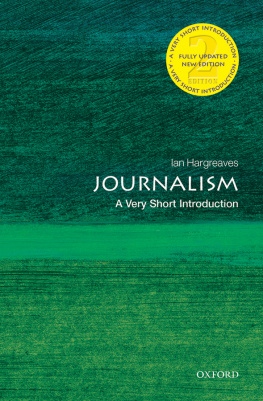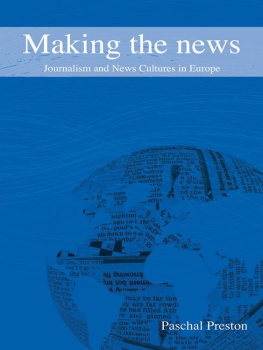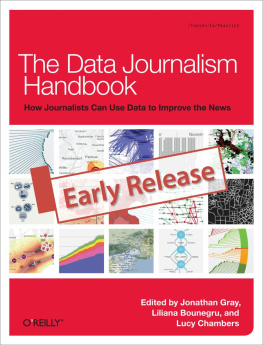CONTENTS
Acknowledgments
Prologue
Introduction: News Journalism Today
The Craft of Slotting: Screenwork, Attentional Practices,
and News Value at an International News Agency
Click and Spin: Time, Feedback, and Expertise
at an Online News Portal
Countdown: Professionalism, Publicity, and Political Culture
in 24/7 News Radio
The News Informatic: Five Reflections on News Journalism
and Digital Liberalism
Epilogue: Informatic Unconscious: On the Evolution of Digital Reason
in Anthropology
Notes
Bibliography
ACKNOWLEDGMENTS
A book is an authorial labor of love but also a bundle of relations, gifts, and debts. My words are necessarily briefer than the individuals and organizations mentioned here deserve. This project was funded principally by a Humboldt Foundation Research Grant from 2008 to 2010, and I want thank the staff and officers of Humboldt not only for supporting my research over the past fifteen years but also for epitomizing the best, most selfless spirit of Kultur and Wissenschaft . My German field research was further sponsored and supported by the Institut fr Kulturanthropologie and Europasche Ethnologie at the Goethe Universitt Frankfurt. Prof. Dr. Gisela Welz, one of the leading lights of anthropology in Germany, was the most generous and brilliant of hosts. I cannot thank her and her colleagues enough for their goodwill and intellectual engagement and for making my time in Frankfurt and Berlin so rewarding and enjoyable. The field research would also very obviously not have been possible without the generosity of the staffs of the Associated Press German Service, T-Online News, and mdr info. I want to thank them and their parent organizations for their willingness to participate in this research project. Although so many kindnesses were shown me in each of these locations, let me just thank a few individuals for going above and beyond the call of duty: Frank Biehl, Jana Hahn, Mike Heerdegen-Simonsen, Johannes Kaufmann, Dietz Schwiesau, Michael Stber, Marc Vesshoff, Peter Zschunke. Lastly, I would also like to thank the following organizations for participating in the background research for this study: derwesten.de, dpa, Hessischer Rundfunk, Frankfurter Neue Presse , National Public Radio, Newseum, the Online News Association, RBB-Inforadio, Der Spiegel , Sdwestrundfunk, Wall Street Journal , washingtonpost.com, and WBEZ-Chicago.
A book, especially an anthropological book, is traveling knowledge. When I set out on this adventure, I was employed by Cornell University and when I returned it was to Rice University. I want to thank colleagues, staff, and administrators at both institutions for their patience, support, and understanding of a life in transition. The writing phase of the project would not have been nearly as much fun had it not taken place in the wonderful, vibrant intellectual community of Rice Anthropology. There exists no better, more risk-taking and rigorous place, in my opinion, to do reflexive anthropology. My senior colleagues, James Faubion and Nia Georges, have been terrific inspirations close at hand while George Marcus has supported and enlivened this work from afar. And, special thanks to Jeff Fleisher and Susan McIntosh for attuning me to the history of cybernetics in archaeology. Rice Anthropologys unique culture of graduate mentoring and faculty-student collaboration has incubated many of the ideas in these pages. For their contributions and commitment to this project and to our intellectual community, thanks to Camille Barnett, Lina Dib, Ereich Empey, Nessette Falu, Mike Griffiths, Seda Karslioglu, Marcel LaFlamme, Jessica Lockrem, Ian Lowrie, Liz Marks, Val Olson, Rachael Petersen, Maria Vidart, Than Vlachos, Jing Wang, and Ethan Wilensky-Lanford (and, of course, to all our friends at Poison Girl and Double Trouble).
Books are materializations of conversations and intuitions, but above all inspirations. This project took shape over several years of talking and thinking digital media. I owe thanks to many interlocutors: Debbora Battaglia, Stefan Beck, Pablo Boczkowski, Tom Boellstorff, Don Brenneis, Charles Briggs, Gabriella Coleman, Steve Coleman, Alex Dent, Alfred Eichhorn, Patrick Eisenlohr, Tarek Elhaik, Jess Falcone, Mike Fischer, Faye Ginsburg, Andreas Glaeser, Ulf Hannerz, Ariana Hernandez, Michael Herzfeld, Charles Hirschkind, Doug Holmes, Graham Jones, Chris Kelty, Kira Kosnick, Paul Liffmann, Joseph Masco, William Mazzarella, James Meador, Anand Pandian, Mark Allen Peterson, Beth Povinelli, Paul Rabinow, Deepa Reddy, Seth Sanders, Hoon Song, Kaushik Sunder Rajan, Helena Wulff, Alexei Yurchak, Kate Zaloom and Barbie Zelizer. Your words and writings have all enriched me and you will find mutant appropriations of them somewhere herein. Two anonymous reviewers for Cornell University Press were all that an author could hope for: smart, supportive, and challenging. Peter Potter, the editor in chief at Cornell University Press, has been a close collaborator on this book and on the Expertise project as a whole. He has taught me as much as anyone about the possibilities and challenges of academic publishing in the digital era.
Finally, a book is also a phase of life. Thanks to my family, especially to my mother, father, and sisters for rock solid support whrend der Verwandlung . To my daughters for unconditional love. To the love of my life, Cymene Howe, for This joy that transects every orbit. I thank her also for being a superbly generous colleague and collaborator. Having read and commented on every page of this book at least twice, it has become hers as well as mine.
PROLOGUE
This Text Informatic
This book is an ethnography of the practices and understandings of digital information in contemporary news journalism. It is also a work of digital information in its own right. One of the most striking realizations for me in doing fieldwork with news journalists was how much of their practice was intimately familiar to another office-based, digitally enabled professional like an anthropologist. Although anthropologists happily consider themselves as fieldworkers at heart, the truth is that we spend most of our time as screenworkers, even in the field. Like my journalistic research partners, my average workday unfolds in front of a personal computer, often with a word-processing program open on my desktop. Like them, I check e-mail frequently (compulsively some sources say) for the purposes of professional correspondence and coordination. Although for somewhat different reasons than they do, I use online news sources frequently throughout the day and have alerts set up to inform me of events relevant to my research and interests. I, too, utilize electronic archives and search engines. My cell phone is, needless to say, also always at hand. In the course of this average workday, therefore, I find myself frequently shifting back and forth between producing texts and managing a variety of information channels, some of which demand that I respond to them on a fast-time basis.
I hasten to add that the differences between the information practices of news journalism and anthropology are also many. One of the more striking differences is that the normal production cycle of anthropological research and writing is much longer and more flexible than that of news journalism. Because we largely set our own timetables for writing, I rarely feel as though I am working on the clock; my deadlines are measured in weeks and months rather than hours and minutes, a fact that my journalist friends seem to both envy and pity.





